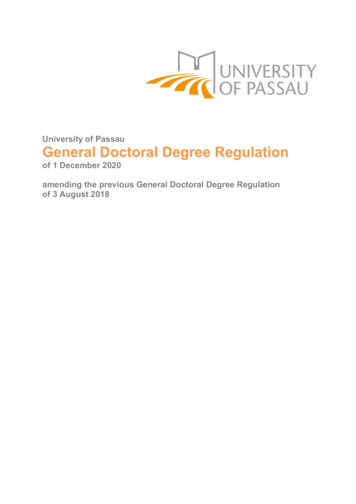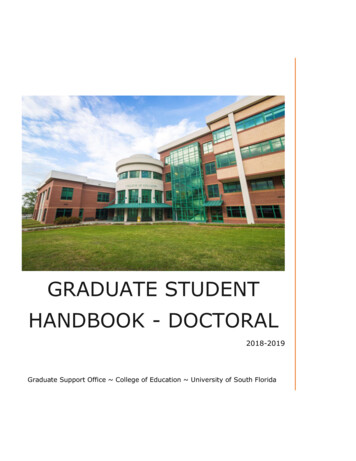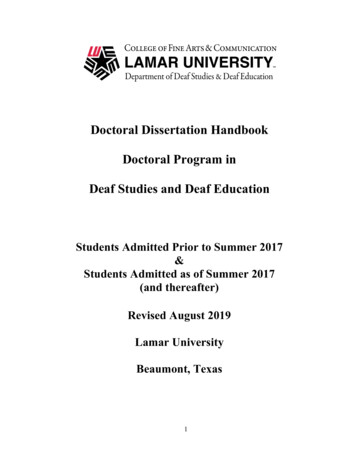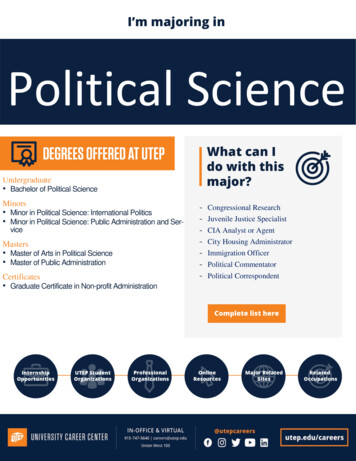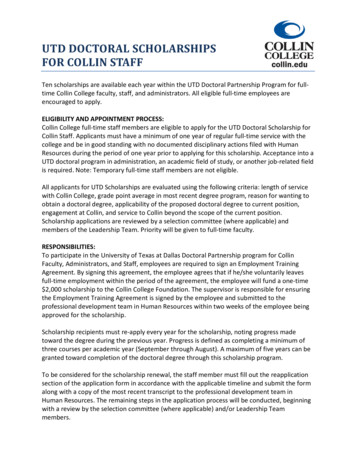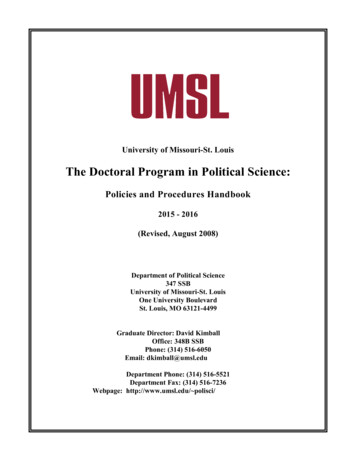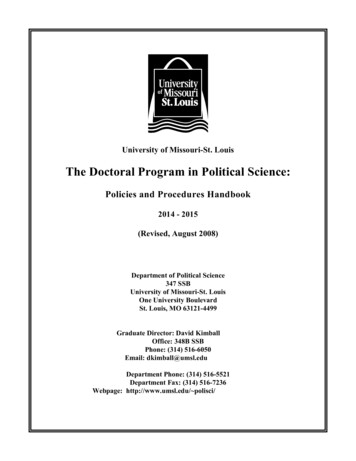
Transcription
University of Missouri-St. LouisThe Doctoral Program in Political Science:Policies and Procedures Handbook2014 - 2015(Revised, August 2008)Department of Political Science347 SSBUniversity of Missouri-St. LouisOne University BoulevardSt. Louis, MO 63121-4499Graduate Director: David KimballOffice: 348B SSBPhone: (314) 516-6050Email: dkimball@umsl.eduDepartment Phone: (314) 516-5521Department Fax: (314) 516-7236Webpage: http://www.umsl.edu/ polisci/
TABLE OF CONTENTSI. INTRODUCTION TO THE DOCTORAL PROGRAM IN POLITICAL SCIENCE. 1II. ADMISSION AND READMISSION. . 1III. THE DOCTORAL CURRICULUM.A. Core. .B. Disciplinary Scope.C. Specialization.D. Internship.E. Grades. .F. Academic Probation. .G. Course Work at Other Universities . .22334444IV. ADVISING. .A. Director of Graduate Studies .B. The Advisor and Subfield Committee. .C. Annual Review. .4556V. THE PH.D. GENERAL EXAMINATION. . 6A. Qualification for the General Examination . . 6B. Scheduling the Examination. . 7C. Content of the General Examination. . 7D. Preparation for the General Examination. 9E. Writing the Examination. 9F. Grading the Written Examination. . 9G. The Oral Examination. . 10H. Master’s Degree Awarded to Doctoral Candidates . 10VI. THE DISSERTATION. .A. Early Preparation. .B. The Dissertation Chair and Committee. .C. The Dissertation Proposal.D. The Oral Defense of the Dissertation Proposal.E. Dissertation Proposals Involving Human Subjects Research. .F. Maintaining Candidacy. .G. Approval and Defense of the Dissertation. .H. Manual of Style Requirement.I. Electronic Submission of Dissertation Proposals, Master's Theses and Doctoral Dissertations.11111112121212121313VII. FINANCIAL ASSISTANCE .A. Graduate Assistantships. .B. Graduate Assistant Assignments and Expectations.C. Teaching Opportunities. .D. External Support and Funding Opportunities.1313131414ii
E. Termination of Funding. . 15VIII. DELAYED GRADES. . 15IX. ACADEMIC DISHONESTY POLICY. 15X. GRADE GRIEVANCE AND APPEAL POLICY. . 15XI. DEPARTMENTAL RECORDS POLICY. 16XII. STUDENT CONDUCT AND CONFLICT RESOLUTION POLICY. . 16iii
THE DOCTORAL PROGRAM IN POLITICAL SCIENCE:Policies and Procedures HandbookI. INTRODUCTION TO THE DOCTORAL PROGRAM IN POLITICAL SCIENCEThe doctoral program in Political Science emphasizes policy studies, and in particular public policymaking. The program fosters a thorough knowledge of diverse analytical skills, alternative approaches to thestudy of politics, and impartial analysis of political institutions and processes. The program is strong in theareas of urban politics, policy processes and institutions, American political behavior, political economy,comparative politics and international relations. Our public policy focus encourages students to adopt amulti-disciplinary perspective and training that cuts across traditional disciplinary boundaries. Besidesadvanced courses in political science, such training includes work in related disciplines such as economics,business administration, criminology and criminal justice, sociology, social work, history, biology, andothers.Our faculty provide unusually accessible, creative, and professional Ph.D. preparation. Their activeresearch and publication records contributed to UM-St. Louis’ scholars being ranked as the ninth mostproductive among small research universities.1The Political Science Graduate Committee, consisting of the Department Chair, the Director ofGraduate Studies, and several faculty members, is charged with the administration of the graduate programin Political Science. The graduate program in Political Science is governed by the policies and proceduresof the Graduate School at UM-St. Louis. Doctoral students are expected to be familiar with the policies andprocedures set forth in this document, the UM-St. Louis Bulletin, and the Graduate School’s policies.II. ADMISSION AND READMISSIONThe faculty members of the department’s Graduate Committee evaluate applications to the Ph.D.program. The deadline for Fall Semester admission is February 15 and October 15 for Winter/Springadmission.2 The Department of Political Science requires: an undergraduate degree with a background inthe social sciences, official transcripts from all universities attended, the GRE General Test score, theTOEFL for international students, a minimum 3.0 GPA overall and in the major on a 4.0 scale, and threeletters of recommendation from persons qualified to evaluate the applicant’s recent academic work. Thestatement of purpose should include a brief statement outlining your reason for pursuing a doctoral degreeand your future plans. Students have an option to submit a written sample of your work that demonstratesyour writing ability. Students interested in funding must apply at the time of application.University of M issouri-St. Louis, News Release, “UM SL Rankings and html. Date last visited, September 16, 2013.2Students must apply online at http://www.umsl.edu/admissions/apply-now.html.1
UM -St. Louis Department of Political ScienceDoctoral Program: Policies and Procedures, Revised, August 20082The principle criteria used to judge applications are the likelihood that the student will successfullycomplete the Ph.D. degree and that the student will contribute positively to the scholarly or policy makingcommunity. Indications that the student meets these criteria include: (a) prior success in graduate andundergraduate studies, often indicated by a grade point average (GPA) of 3.5 or better, (b) above averageperformance on the Graduate Record Examination (GRE), (c) a statement of the applicant's reasons forseeking a Ph.D. at UM-St. Louis, (d) letters of recommendation from academics who specifically indicatethe likely success of the applicant in our Ph.D. program, and (e) other appropriate evidence. The GraduateCommittee may recommend unconditional admission or make admission conditional on the student’sachievement of certain academic goals early in the program. While the Political Science Graduate Committeerecommends admission, the Dean of the Graduate School makes the final admission decision.A student who drops out of the doctoral program must apply for readmission and go through theregular admission process. A student may drop out either by formally resigning from the program or byfailing to register for at least one of the regular semesters (Fall and Winter) of the academic year. TheGraduate Committee may recommend that the Dean of the Graduate School approve a leave of absence fora student for a specific period.III. THE DOCTORAL CURRICULUMThe Ph.D. curriculum blends analytical rigor and practical knowledge. Accordingly, the doctoralcurriculum includes: (a) the development of a common core of analytical tools, (b) the survey of diverse areasof political inquiry, and (c) the mastery of an individually tailored program of specialized expertise in asubfield of political research.A. CoreSix one-semester courses (18 credit hours) provide a common core of training for Ph.D. students inour program. The courses provide an indispensable framework of research methods, policy processes andinstitutions.MethodologyPS 6401 Introduction to Policy Research (or equivalent)PS 6402 Intermediate Techniques in Policy ResearchPS 6403 Advanced Techniques in Policy ResearchProcess and InstitutionsPS 6430 Proseminar in American PoliticsPS 6440 Proseminar in Public AdministrationPS 6442 The Policy Processstudy.Ordinarily, the student completes this portion of the curriculum in the first four semesters of full-timeAdditional Skills. Each student will develop an individual program for achieving appropriatecompetence in their areas of specialization, for example in economics, foreign languages and other advancedanalytic skills.
UM -St. Louis Department of Political ScienceDoctoral Program: Policies and Procedures, Revised, August 20083B. Disciplinary ScopeThe student, in consultation with his or her advisor, constructs the remaining part of the curriculumaround individual interests and career goals. One part of the curriculum introduces the student to the breadthof the political science discipline. This part of the curriculum requires a survey of diverse areas of politicalinquiry. To achieve this goal, the student selects four additional courses (12 credit hours) that surveyimportant subfields of political science. In most cases the student will select from the following list.PS 6404 Multi-Method Research DesignPS 6410 Introduction to Policy AnalysisPS 6420 Proseminar in Public LawPS 6422 Law, Courts, and Public PolicyPS 6431 American Political DevelopmentPS 6432 Intergovernmental RelationsPS 6448 Political Economy of Public PolicyPS 6450 Proseminar in Comparative PoliticsPS 6460 Proseminar in Political TheoryPS 6470 Proseminar in Urban PoliticsPS 6480 Proseminar in International RelationsPS 6482 International Political EconomyOther courses may be used to satisfy this survey requirement if approved by the student’s advisorand the Director of Graduate Studies. Note that students with a Master’s degree in political science fromanother institution may meet a part of this requirement by transferring courses, subject to approval by theDirector of Graduate Studies and the student’s Advisor.C. SpecializationThe student completes 6 courses (18 credit hours) in a subfield of political science and, within thatsubfield, an area of concentration. Subfields in political science include Public Policy (includingComparative Public Policy), Urban Politics, American Politics, Comparative Politics, International Relations,Political Economy, Public Law, and Public Administration. Areas of concentration within Public Policymight include Economic Policy or Health Policy, Social Welfare, Criminal Justice, Labor and Employment,Housing, Environmental Protection, Policy Analysis, Public Budgeting and Finance, or other areas notenumerated.Students may choose to specialize in two subfields of political science. These students shouldconsult with faculty members in both subfields to develop a suitable program of study.This list is not inclusive. Students should consult their advisor and the Director of Graduate Studiesfor additional options tailored to individual career goals. Students may need to acquire knowledge and skillsmore commonly taught by faculty in another discipline such as Economics, Public Administration,Criminology and Criminal Justice, Gerontology, Sociology, History, or the sciences. These students shoulddevelop a suitable program in that discipline in consultation with the appropriate faculty and with theapproval of the Director of Graduate Studies. The Department has explicit agreements for transferring creditto the Ph.D. in Political Science from the UM-St. Louis Master’s in Public Policy Administration, theMaster’s in Economics, and the Gerontology degrees.
UM -St. Louis Department of Political ScienceDoctoral Program: Policies and Procedures, Revised, August 20084D. InternshipPh.D. students may take an internship, PS 6495 (up to six credit hours) to gain first-hand experiencein research and administrative positions. Those credit hours would apply to the area of specializationcomponent of the curriculum. Consult the Graduate Director and Internship Coordinator for furtherinformation.E. GradesCourse grades are important in doctoral study because they: (1) indicate the student’s level ofprofessional knowledge and skills, and (2) the student’s preparation for Ph.D. examinations and thedissertation. Students are expected to have a GPA of at least 3.5 in courses taken at UM-St. Louis. Studentswith a GPA below 3.5 in these courses can take examinations only if approved by the Director of GraduateStudies and the Graduate Committee.F. Academic ProbationThe Graduate School’s regulations state that, “a department will place a graduate student onprobation if the GPA falls below 3.0 or if it regards progress as unsatisfactory.” Students whose grade pointaverages fall below 2.0 will be dismissed. A delayed grade becomes an F grade after a one year period. Seethe UM-St. Louis Bulletin for details.G. Course Work at Other UniversitiesGraduate work completed at other universities may be credited toward the Ph.D. requirements ifthese courses meet the curriculum objectives of the doctoral program. A student who has completed suchgraduate work, or taken a graduate degree at another institution, should request the Director of GraduateStudies to evaluate her or his record to determine the amount of credit that may be transferred to the UM-St.Louis Ph.D. in Political Science. Normally, no more than 12 hours of political science or publicadministration credit is transferable to the Ph.D. program.The University requires that all credit hours for a Ph.D., including transfer credits and thedissertation, be completed during a continuous eight-year span. Exceptions to this rule require a writtenappeal to the Graduate School.Students enrolled in the doctoral program may take advantage of course offerings at WashingtonUniversity in St. Louis, St. Louis University, or other campuses of the University of Missouri system. Forthose who wish to concentrate in highly specialized areas, this cooperation expands the number and type ofcourses available to students in both programs. Students wishing to take courses that are not offered at UMSt. Louis must obtain the permission of the Graduate Director. In such cases, the fees charged are at the UMSt. Louis rates.IV. ADVISINGTo complete the Ph.D. successfully, students must carefully plan their curriculum, prepare for thePh.D. examinations, and develop their doctoral dissertation. Deciding to pursue a doctoral degree requireslong-term commitment, persistence, and effort. Unlike Bachelor’s and Master’s degrees, the Ph.D. requiresmuch more than the accumulation of successfully completed course work. To succeed, a student must writea doctoral dissertation—that is, she or he must design, conduct, write about, and defend a serious, objective,important, and theoretically informed monograph. Each student does most of this work alone. Unlike discrete
UM -St. Louis Department of Political ScienceDoctoral Program: Policies and Procedures, Revised, August 20085course work that is required for undergraduate and some graduate work, students must find the motivationto work under ambiguous and open-ended conditions. To qualify to write the dissertation, students must passcomprehensive examinations that test each candidate's capacity to understand—and to care about—politicalscience.Students should seek faculty advice about their dissertation early in their doctoral careers. Theprogram faculty at UM-St. Louis has a firm commitment to working with individual doctoral students toensure careful, and realistic, planning for the degree program. This commitment includes providingopportunities for individualized counseling to: (a) help the student develop clear and realistic objectives inthe program, and (b) provide clear and timely feedback concerning individual progress in the program. Tomeet these commitments, the program incorporates organized mechanisms for advising students in thedoctoral program.In addition to these formal advising opportunities, each student must make a special effort tointroduce herself or himself to a wide array of faculty and consult with them informally.A. Director of Graduate StudiesEntering students must meet with the Director of Graduate Studies in Political Science for initialorientation and program planning. The Graduate Director keeps records on individual progress in theprogram and advises students in meeting the formal requirements for degree progress in the Graduate School.The Graduate Director is available to respond to questions regarding program requirements and activities.The Director of Graduate Studies maintains a Political Science Graduate Studies web portal on MyGateway,the UM-St. Louis course and organization management system. Doctoral students will have access to a rangeof information about the doctoral program, department and campus events, funding opportunities,fellowships, job opportunities, political science conferences and the discipline of Political Science.B. The Advisor and Subfield CommitteeIn the semester before they take the general examination and in consultation with the GraduateDirector, each student selects an Advisor and a two member Subfield Committee chaired by the Advisor(Subfield Chair). Students must ask Political Science faculty to serve on their Subfield Committee (threemembers) and the Methods Committee (two members). The faculty will serve if their workloads permit itbut they are not required to do so.The Advisor should be a Political Science faculty member in the student’s major field of interest.The Advisor and the student will select two additional members from the Department of Political Science.If the student’s work requires additional expertise she or he may draw on faculty members from otherdepartments or universities, subject to the approval of the Advisor and Graduate Director.The Advisor and the Subfield Committee have the following responsibilities:1. To help the student prepare for the General Examination, especially the subfield section.2. Normally, this committee forms the nucleus of a student’s dissertation committee,although that is by no means mandatory. Accordingly, the student should also consultit regarding dissertation topics, research questions, and appropriate methodology.
UM -St. Louis Department of Political ScienceDoctoral Program: Policies and Procedures, Revised, August 20086C. Annual ReviewOnce a year, usually in the spring, the Graduate Committee will review the record of doctoralstudents. The Committee will solicit from the faculty written evaluations of: (a) performance in specificcourses, and (b) overall potential for completing the doctorate. The Graduate Committee will note particularstrengths and areas for improvement and prepare a written evaluation. The Graduate Committee uses theseevaluations when it makes decisions about financial assistance and about continuing students in the program.V. THE PH.D. GENERAL EXAMINATIONThe student must successfully complete the General Examination before she or he advances tocandidacy. The General Examination has three parts: a week long written examination, an oral examination,and an oral defense of a dissertation plan. The written examination has three parts: (a) methodology, (b)policy process and institutions, and (c) a subfield.The General Examination requires students to demonstrate three kinds of knowledge: Students must show a comprehensive understanding of the literature in the core programfields and in their individual fields of study. Students must prove that their critical analytic skills and research capability are sufficientto undertake original dissertation research. Students must display appropriate mastery of a political science or policy subfieldand within that subfield an authoritative command of one area of specialization orappropriate mastery of two subfields of political science.A. Qualification for the General ExaminationStudents usually take the General Examination at or near the completion of course work. Allstudents who plan to take the General Examination must meet with the Graduate Director approximately onesemester before the semester in which the student wishes to take the exams to discuss the examinationprocess.The Director of Graduate Studies determines eligibility to take the General Examination. To qualifyfor examination, the student must have completed all courses in the required core curriculum of the doctoralprogram. The student must, at a minimum, have completed at least 54 credit hours toward the degree by thescheduled examination date. Students are expected to have a GPA of at least 3.5 in courses taken at UM-St.Louis. Students with a GPA below 3.5 in these courses can take examinations only if approved by theDirector of Graduate Studies and the student’s Advisor.Students are not permitted to take the General Examination if: (1) they have delayed grades, and (2)if their methodology paper has not been approved by the Methodology Committee at least two weeks priorto the General Examination.The Graduate School Form, D-1: Appointment of Comprehensive Examination Committee, must besubmitted to the Graduate School prior to taking the General Examination. The D-2: Appointment of
UM -St. Louis Department of Political ScienceDoctoral Program: Policies and Procedures, Revised, August 20087Doctoral Dissertation Advisor, must also be submitted to the Graduate School. Both forms should becompleted as soon as students have taken 54 hours of course work. The Graduate Program’s administrativeassistant will assist students regarding the submission of the appropriate forms to the Graduate School.B. Scheduling the ExaminationThe General Examination is scheduled three times a year: in April, August, and December. TheGraduate Director determines the actual date approximately one semester in advance of the examination. Theexamination dates will be posted on the Graduate Studies portal and students will be notified individually.Students who plan to take the General Examination should organize their schedule around this date well inadvance. Only in extraordinary circumstances will any student be permitted to take the General Examinationon a different date. The student must petition the Graduate Director for the change, in writing or by e-mail,and state the reason why a change is requested. The Graduate Director will respond to the student’s requestby e-mail within one week.C. Content of the General ExaminationThe General Examination consists of three sections: Methodology. This section consists of a paper that addresses research design and methodsapplied to political science and policy analysis as well as analytic frameworks forformulating and analyzing public policy. Students should prepare this paper a few monthsin advance of the date set for the other two sections in close consultation with the facultywho specialize in quantitative research methods. The paper must be of “passing” quality atleast two weeks in advance before a student may proceed with the rest of the GeneralExamination.The Methodology faculty have approved the following criteria in grading methodspapers for the General Examination:“Methods graders expect an answer to address a topic of interest to the student,using techniques or tools learned in their methods courses. The answer may bean original work (e.g., written from scratch) or not (e.g., a replication of apublished article or a revision of a paper). However, the analysis must useempirical data.An acceptable answer must be organized along the lines of a publishedanalysis—there must be a literature review, a research design, and an intelligentdiscussion of the methods used. The exam needs to demonstrate proficiency inthe methodological technique used, which includes an explanation of themethod and an exploration of any assumptions.A student may revisit a paper written for a previous course, but any such papermust improve upon the methodological technique used in the original.Improvements could be, for example, collecting/using additional data,additional variables, or a different modeling technique. Graders will expect tosee the original version for comparison purposes. A replication must also add
UM -St. Louis Department of Political ScienceDoctoral Program: Policies and Procedures, Revised, August 2008value to the original analysis.A student should consult with the grading committee prior to handing in thefirst draft. Graders expect the first draft to be relatively complete.” Policy Process and Institutions. These questions address political and administrativeprocesses through which public policy is formulated and implemented. Answers shouldintegrate knowledge from the core, subfield, and, where appropriate, specialization courses.The student will have some choice in selecting questions to answer on this section of theexamination. These questions are not provided in advance, but questions asked on previousexaminations are available to all students and they are strongly encouraged to look overthese questions.The Graduate Director will appoint two faculty members to write and grade these twosections of the General Examination. One of the members will serve as Chair to supervisethe examination. Subfield and Specialization. These questions address the student’s area of expertise,defined in consultation with his or her advisor and subfield committee and with the Directorof Graduate Studies. Normally, the student will choose a subfield that includes, but is notlimited to, the student’s field of policy concentration (the 18 credit hour program of coursework). Subfields in political science include Public Policy (including Comparative PublicPolicy), Urban Politics, American Politics, International Relations, Public Law, PublicAdministration, Comparative Politics, or Political Economy. The student should be carefulto designate the subfield in an area in which she or he has had extensive preparation.Students whose substantive work is heavily multidisciplinary should define their subfieldappropriately.Students have the option to take the General Examination in two subfields of politicalscience, subject to the approval of the student’s Advisor. Students are expected to haveextensive preparation in both subfields. Students who plan to take the General Examinationin two subfields must have two faculty members whose areas of expertise lie in bothsubfields.Three faculty members write an
The Doctoral Program in Political Science: Policies and Procedures Handbook 2014 - 2015 (Revised, August 2008) Department of Political Science . St. Louis, MO 63121-4499 Graduate Director: David Kimball Office: 348B SSB Phone: (314) 516-6050 Email: dkimball@umsl.edu Department Phone: (314) 516-5521 Department Fax: (314) 516-7236 Webpage: http .


